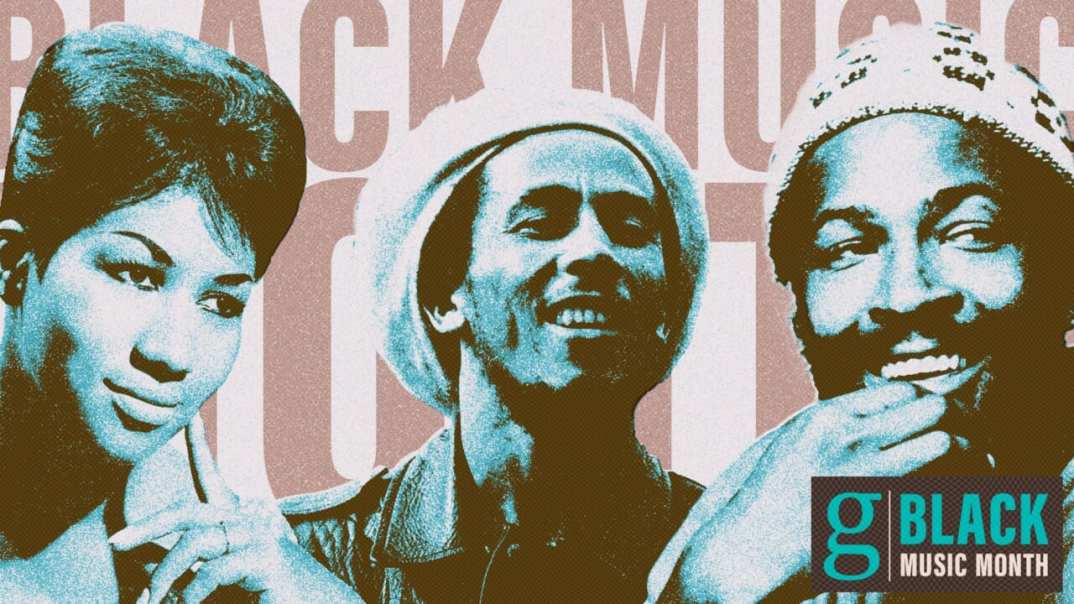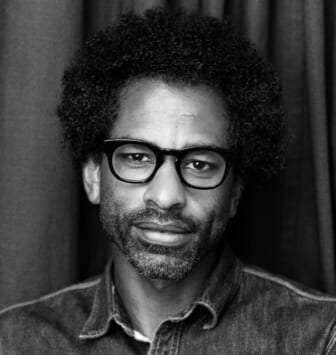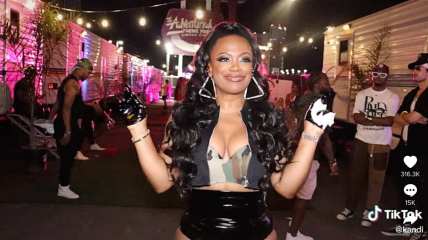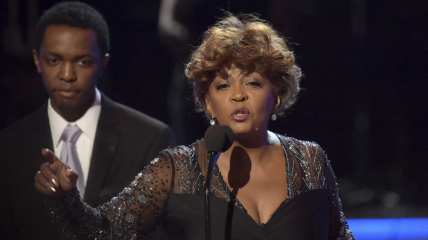10 Blackest Songs: What is the sound of Blackness?
OPINION: For Black Music Month, theGrio is featuring a weekly series in which our writers name the songs they believe best represent the Black experience. Today, Toure´ weighs in with his list, which leans into the genres of soul, funk and blues.

Editor’s note: The following article is an op-ed, and the views expressed are the author’s own. Read more opinions on theGrio.
The idea of choosing the 10 Blackest songs is intimidating as hell. Blackness is deep, dynamic and complex. But it’s Black Music Month, so we’ve gotta do it. Below is my list, and in the next two weeks, my music-loving brothers Panama Jackson and Matthew Allen will come with their list of the 10 Blackest songs. But you know what it is—I’m curious to see what they’ll say, but between us, this is the real list.
Yes, musicians have done a better job of articulating Blackness than artists in any other artform have, but Blackness is so deep that it cannot be summed up in one song. Still, there are songs that are so meaningful to the Black community that they make up the playlist of who we are. There are songs that tell the story of being Black in a deep way. There are songs that show the essence of being Black in their own way. And there are songs that are the apotheosis of a genre of Black music.
As I made this list, I looked for songs that fit those values—I asked myself 1) is it deeply meaningful to the Black community? or 2) is it telling the story of being Black in America? or 3) does it somehow show the essence of being Black? or 4) is it the zenith of a genre of Black music?
As I collated this list, I spoke to a couple of musicians to get their take and gravitated toward their advice but ultimately followed my gut—which drew me mainly to soul, funk and blues, and not to hip-hop or disco. Perhaps this is because I believe soul, funk and blues are often in conversation with what it means to be Black in a more overt way than those later genres. Obviously, hip-hop and disco are extraordinarily Black, and their exclusion carries with it no shade—hip-hop is my musical mother tongue—but when I hear the 10 songs below, I get chills in my Black soul, and my face crinkles up as I start to sway. They have a control over me that goes beyond my conscious. They are, for me, the sound of Blackness. (Presented in no particular order.)
“Redemption Song,” Bob Marley: This is the legendary natural mystic singing the song of Black people. He starts with us being taken from Africa and lands on the imperative for us to liberate ourselves from mental slavery. He means destroying colonialism and white-centrism, but he’s also just giving power and freedom to Black people by telling us true freedom is within our grasp. The message is powerful, and the messenger is singing a timeless song.
“Trouble Man,” Marvin Gaye: Marvin is singing a sort of spiritual history of Black people—”I come up hard, but now I’m cool. Couldn’t make it sugar, playin’ by the rules.” We had to fight to make it, and we had to find creative ways to slide through the matrix, but now we’re cool, and when Marvin says, “We’re cool,” there are so many meanings that fit that word. Marvin’s one of the Blackest singers of all time—the Black male falsetto is a thing of beauty—and his performance on this record is historic. In the middle of it, he raps—in 1972. Before the first time Kool Herc brought out his set.
“Before I Let Go,” Maze featuring Frankie Beverly: It’s just the sound of joy. This song lifts me up every time. It has a special reverence among Black people because it’s the ultimate Black party jam—good for cookouts, birthdays and weddings. Questlove once told me in his journey as a DJ that he learned that you have to play “Before I Let Go” at every Black function. Like, this song is Blackfamous—everyone knows “Redemption Song.” but if you throw “Before I Let Go” on at a mixed party, I think you’ll see a different reaction from Blacks and whites. This song has been the ultimate Black party jam for so long that you’ve probably grooved to it at 100 parties so there are all sorts of positive associations all wrapped up in this song.
“Flashlight,” Parliament: This is the apotheosis of funk. It’s a legendary Black party jam, and the musicianship here is an example of Black excellence. The way they play with rhythm is incredible. The song is so deeply in the pocket it’s scary.
“Respect,” Aretha Franklin: She’s one of the greatest singers of all time, and you can hear the Black church all over her style. If “Trouble Man” is a spiritual history of the Black man, then maybe “Respect” is a spiritual history of the Black woman. Aretha’s performance is incendiary, and the message is so real and direct: I just want respect. This song has become a feminist anthem, and it’s been in so many movies, and TV shows that it will live forever. It’s one of those songs that gets played so often in America that I think of it as one of those songs that comes in through the windows. You can’t help but know “Respect.”
“Adore,” Prince: This is the apotheosis of Prince, the apotheosis of ’80s soul, the apotheosis of romantic loverman crooning. Prince’s performance as a singer is dripping with soulfulness. He’s one of the Blackest music makers of all time. This song shows us his genius as a singer, but it also shows his brilliance as a writer. Consider this: Critical to Black music for decades has been the sense that Saturday night (and the bacchanal that goes with it) isn’t really that far away from Sunday morning (and the sanctity of church). Black music loves to combine the sacred and the profane by linking gospel and sexual music. One of the central strains of the conversation that Black music has been having with us for decades is that we can be sacred and profane at the same time or at least within the same body, and I think this song takes that conversation to its highest point. I mean, c’mon—Prince describes having passionate sex while angels watch and weep at the beauty.
“Superstition,” Stevie Wonder: The incredible funkiness of this record and Stevie’s bluesy singing destroy me every time.
“Bam Bam,” Sister Nancy: The greatest dancehall song ever made.
“Mannish Boy,” Muddy Waters: The greatest blues song ever. The blues is the root of Black music as well as the root of the tree that is American music. If it’s a sound from this country, it’s the child or the grandchild of the blues, so I can’t have a list that doesn’t speak to the blues. This song is an incredible performance by one of the masters of the blues, and it poetically describes the Black American experience.
“Strange Fruit,” Billie Holiday: Black music has, at times, been a place where we could speak up and demand change. A place where we could be politically aggressive and boldly revolutionary. “Strange Fruit” is an attack on white supremacy and white domestic terrorism—it’s about lynching—and for Holiday to sing this in her day took courage. So the public presentation of the song is a Black political act, but my God, the way Holiday’s iconic voice just slices through your soul is just amazing.
Honorable mentions: There are so many more I could have named. I thought about “Untitled” by D’Angelo. “Saturday Love” by Cherrelle and Alexander O’Neal. “Everybody Loves the Sunshine” by Roy Ayers. “Papa Was a Rolling Stone” by the Temptations. “Nothin’ Goin’ on But the Rent” by Gwen Guthrie. “A Change Gonna Come” by Sam Cooke. “Chocolate City by Parliament. Almost anything from James Brown could make this list. Same with Sly Stone, Nina Simone, and Curtis Mayfield. I thought hard about including some Miles Davis—“Bitches Brew” or “Kind of Blue”—because Miles is one of the Blackest ever, but jazz is such a different animal from popular music that I felt like leaving that out. But I could do a whole list with just Davis, John Coltrane, Thelonious Monk, Louis Armstrong, Ella Fitzgerald, Billie Holiday and Max Roach. In wrestling with how to include hip-hop, I considered “Alright” by Kendrick Lamar, a sort of anthem for Black resilience, and “The Story of O.J” by Jay-Z, where he speaks of what it means to be Black and some A Tribe Called Quest and Public Enemy. But, maybe I’m too close to hip-hop.

Touré hosts the podcast “Touré Show” and the podcast docuseries “Who Was Prince?” He is also the author of seven books.
TheGrio is FREE on your TV via Apple TV, Amazon Fire, Roku, and Android TV. Please download theGrio mobile apps today!


